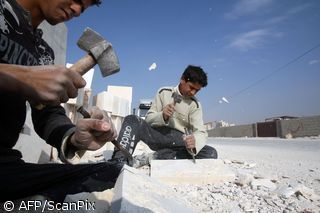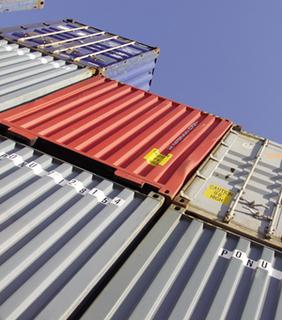Dragon Oil and Petronas to Yield Their Shares in Turkmen Projects to Russia's Zarubezhneft and Itera
Published:
19 October 2003 y., Sunday
Western companies have been contemplating whether to accept or reject Ashkhabat's offers to develop the hydrocarbon reserves on the Turkmen shelf of the Caspian Sea. Turkmenistan has insisted that its 32 blocks totaling over 70 thousand square kilometers contain 16.5 billion tons of oil equivalent. Investors are daunted not only by the insufficient extent of the blocks' exploration but also by the absence of export prospects. Dragon Oil and Petronas are showing investors one way out of this blind alley with their plan to concede their project shares to the Russian company Zarubezhneft and international gas trader Itera in exchange for access to export trunks.
Russian Zarubezhneft and Itera are planning to set up a joint venture to participate in at least two oil-and-gas projects on the Turkmen shelf of the Caspian Sea. A source close to Zarubezhneft executives told RusEnergy.com that these are projects to develop the Cheleken Block and the neighboring Block-1. A little earlier, Zarubezhneft CEO Nikolai Tokarev affirmed it in an interview to the Oil & Capital magazine (№ 11 - 2001). Official representatives of the operators, however, refuse to confirm the existence of the deal with Russian companies.
An agreement on the Russian joint venture unifying the projects will be signed in the coming months, a source in Zarubezhneft reports. The joint venture will allegedly acquire an unspecified part of the present participants' shares. Currently, these projects are already being implemented in accordance with the production sharing agreement (PSA) between Turkmenistan and foreign companies. Dragon Oil is the Cheleken operator with its controlling stock owned by the United Arab Emirates (through the Emirates National Oil Company). Malaysia's Petronas is the operator of the Block-1 development project.
The intention of the Zarubezhneft-Itera alliance to join the projects has received an enthusiastic response from both foreign companies and Turkmen authorities. After meeting with the heads of the Russian companies Turkmenistan's president Saparmurat Niyazov declared his support of their plans.
Šaltinis:
RusEnergy.com
Copying, publishing, announcing any information from the News.lt portal without written permission of News.lt editorial office is prohibited.
The most popular articles
 The European Commission has approved, under EC Treaty state aid rules, an Italian framework temporarily adapting certain existing risk-capital schemes to increase companies' financing possibilities during the current economic crisis.
more »
The European Commission has approved, under EC Treaty state aid rules, an Italian framework temporarily adapting certain existing risk-capital schemes to increase companies' financing possibilities during the current economic crisis.
more »
 The European Commission has authorised, under EC Treaty state aid rules, a Maltese measure to help businesses to deal with the current economic crisis.
more »
The European Commission has authorised, under EC Treaty state aid rules, a Maltese measure to help businesses to deal with the current economic crisis.
more »
 We're making progress. That's the word from Treasury Secretary Tim Geithner about settling the financial markets.
more »
We're making progress. That's the word from Treasury Secretary Tim Geithner about settling the financial markets.
more »
 According to a new report released by NextGen Research, global markets for financial kiosks and enhanced ATMs will grow at a compound annual rate of 9 percent, to include more than 186,000 financial kiosks and nearly 2.5 million ATMs by 2013.
more »
According to a new report released by NextGen Research, global markets for financial kiosks and enhanced ATMs will grow at a compound annual rate of 9 percent, to include more than 186,000 financial kiosks and nearly 2.5 million ATMs by 2013.
more »
 Non-farming Latvians are buying pigs to beat the economic crisis.
more »
Non-farming Latvians are buying pigs to beat the economic crisis.
more »
 Is your money well spent at EU level? Every year, in April, the EP concludes its examination of EU spending for the financial year closed 16 months previously.
more »
Is your money well spent at EU level? Every year, in April, the EP concludes its examination of EU spending for the financial year closed 16 months previously.
more »
 In the construction sector, seasonally adjusted production1 decreased by 1.0% in the euro area2 (EA16) and by 2.1% in the EU272 in March 2009.
more »
In the construction sector, seasonally adjusted production1 decreased by 1.0% in the euro area2 (EA16) and by 2.1% in the EU272 in March 2009.
more »
 Between 2000 and 2008, EU27 trade in goods with Russia more than tripled in value, with EU27 exports to Russia rising to 105 bn euro in 2008 from 23 bn in 2000.
more »
Between 2000 and 2008, EU27 trade in goods with Russia more than tripled in value, with EU27 exports to Russia rising to 105 bn euro in 2008 from 23 bn in 2000.
more »
 The European Commission has launched today a call for proposals covering key energy infrastructure projects such as energy interconnections, offshore wind energy and carbon capture and storage as part of the implementation of the EEPR.
more »
The European Commission has launched today a call for proposals covering key energy infrastructure projects such as energy interconnections, offshore wind energy and carbon capture and storage as part of the implementation of the EEPR.
more »
 During its plenary session on 13 May 2009, the European Economic and Social Committee adopted a key opinion on responding to the crisis in the European automotive industry.
more »
During its plenary session on 13 May 2009, the European Economic and Social Committee adopted a key opinion on responding to the crisis in the European automotive industry.
more »